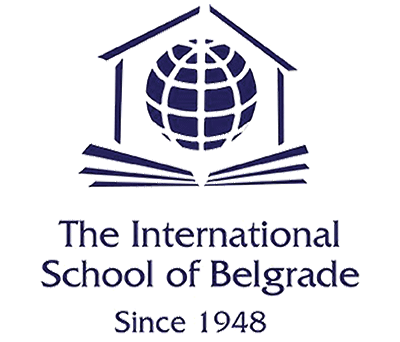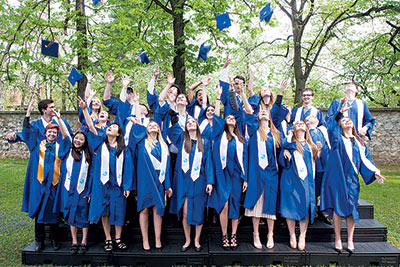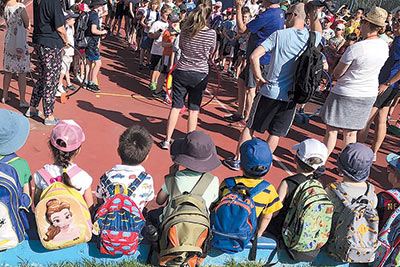The International School of Belgrade (ISB), the leading light of international education in Belgrade for more then 70 years, has a new Director – Andrew Derry. Andrew, who has worked in international education for 28 years and in school leadership for 22 years, has many plans and is very ambitious for ISB
Education is undergoing a fundamental shift all over the world. Traditional models, where pupils sit in rows and the teacher delivers information, are outdated and largely ineffective. A personalised approach, based around inquiry and understanding concepts, is far more effective.
You’ve spent almost three decades working in international education and have been involved in school management for 22 years, and now you are at the helm of the ISB, an institution with decades of tradition and an enviable reputation. What kinds of plans do you have for the International School of Belgrade?
I am very ambitious for ISB. It already has the foundation and a reputation as being the best international school in Belgrade. Our next goal is to be recognised as the best international school in the entire region. That’s ambitious, but also realistic, and why wouldn’t we want to be ambitious for our students?
You’ve worked around the world, participating in the work of committees and advisory councils for economic development, universities and the advancement of education. What is the future of education?

Education is undergoing a fundamental shift all over the world. The traditional models, where students sit in rows and the teacher delivers information, are outdated and largely ineffective.
They were never based around the best learning practises, instead they were designed for the industrial revolution and a need to ‘control’ the population. Modern brain research and pedagogical research show clearly that a personalised, student-centred approach, based around inquiry and understanding concepts, is far more effective. While the old traditional model is passive and relies on the teacher ‘doing learning at the student’, the modern approach is active, where the student has ownership over the learning and the teacher works alongside them in a personalised way. As a full IB school, ISB has been using this approach for years and really has the personalised approach down to a fine art.
All of the work we do ensures that our students have access to the finest universities around the world
The results of ISB pupils are outstanding even in global frameworks, which ensures that they can enrol in the most prestigious universities without a problem. How do young people motivate themselves to strive for and realise great achievements?

Motivation has to be intrinsic. In my experience, lack of motivation and poor behaviour stem from students not being engaged or empowered in their learning.
Quite honestly, if I had to sit all day, in rows, listening to a teacher deliver information to me, or doing worksheets that are all the same for every child, I think I would also lack motivation. Unfortunately too many schools still use this approach.
If your approach is truly personalised, where learning is an active process, with the student at the centre, where students are fully engaged and empowered, then there is intrinsic motivation and, of course, this leads to amazing progress.
At ISB, you believe that the education process isn’t all about achieving the required results, but rather also about mastering the skills and knowhow required for the new age. Do you also teach pupils critical thinking, problem solving, communication skills, assuming personal responsibility etc.?

Absolutely yes, but we also create opportunities to put these skills into practise. According to The World Economic Forum report, 65 per cent of our children currently in Primary School will enter a job that does not yet exist. How do we teach a child for that?
At International School of Belgrade we talk about preparing our children for a VUCA world (Volatile, Uncertain, Complex and Ambiguous). So, while knowledge is important, for us it is more about applying your understanding and using your skills and attributes to solve real-word complex and ambiguous problems.
How are your teaching programmes designed and which doors are opened by your primary and secondary school diplomas?
All of our programmes are built around the International Baccalaureate. This is recognised as the gold standard in international education and we are the only school authorised to offer the full suite of IB programmes, including the Primary Years Programme (PYP), The Middle years Programme (MYP) and the Diploma Programme (DP). In addition, we are fully accredited by international agencies, including The Council of International School (CIS) and the New England Association of Schools and Colleges (NEASC).
We actively recruit the very best teachers from around the world, ensuring that our faculty is diverse, highly qualified and highly trained
What is the top quality of your teachers/ lecturers?
Our teachers are our most important asset and they have the biggest impact on student learning. We actively recruit the very best teachers from around the world, ensuring that our faculty is diverse, highly qualified and highly trained. We are proudly a non-profit school and 75 per cent of our revenue goes directly to cover staff costs. At this moment in time, almost 70 per cent of our teachers have international teaching backgrounds and qualifications.
How important is it for parents to be actively engaged in the educating of their children and in the school community?
At International School of Belgrade, we talk about purposefully building ‘Social Capital‘. This is the idea that when we all work together for the benefit of the child, it has a profound impact on their learning. Having an active and engaged parent body has a direct and positive impact on the whole school. Already this year we have held numerous parent conferences, parents’ coffee sessions and feedback sessions. In addition, as a non-profit school, we have a Board of Governors with elected parent members, as well as a very active Parents, teachers, Student Association (PTSA).